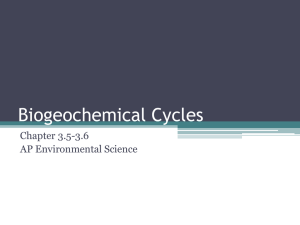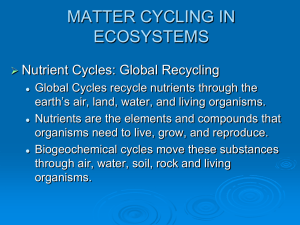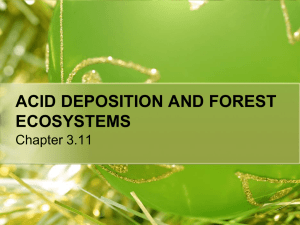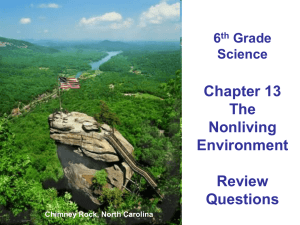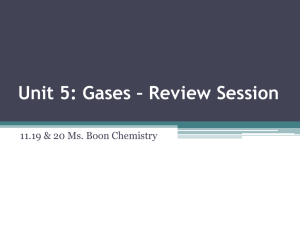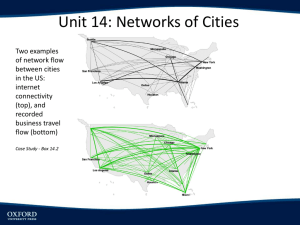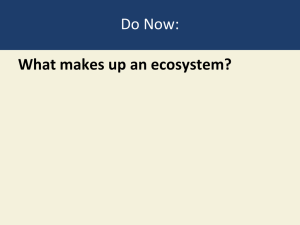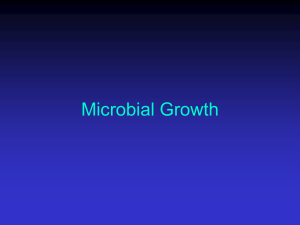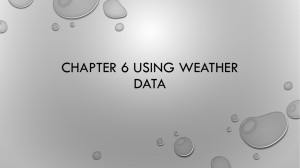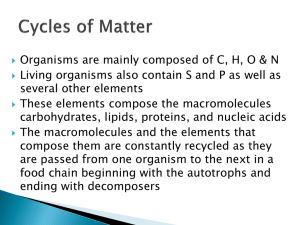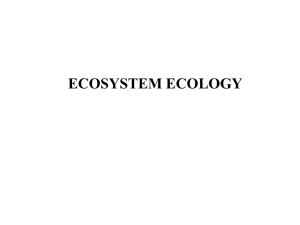chapter 3 powerpoint
advertisement
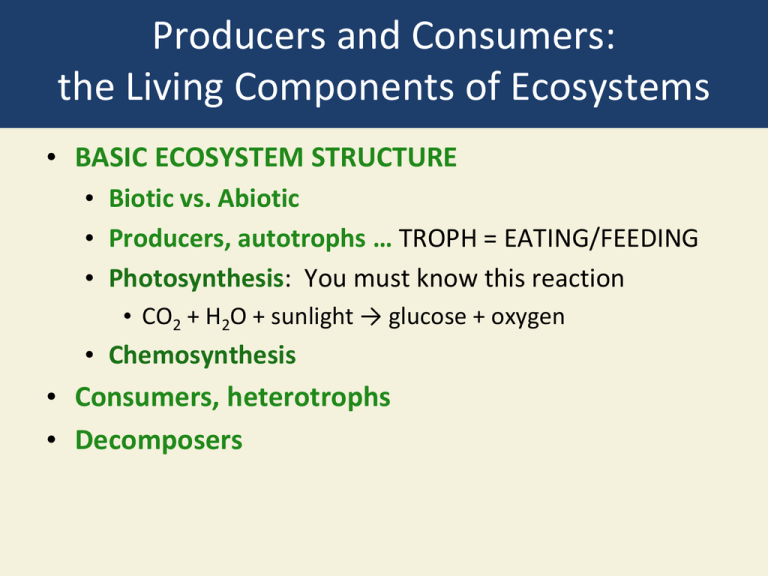
Producers and Consumers: the Living Components of Ecosystems • BASIC ECOSYSTEM STRUCTURE • Biotic vs. Abiotic • Producers, autotrophs … TROPH = EATING/FEEDING • Photosynthesis: You must know this reaction • CO2 + H2O + sunlight → glucose + oxygen • Chemosynthesis • Consumers, heterotrophs • Decomposers Energy Flows Through Ecosystems in Food Chains and Food Webs • Food chain • Movement of energy and nutrients from one trophic level to the next … TROPHIC = EATING/FEEDING • FIG 3.13 • Food web • Network of interconnected food chains FIG 3.14 Usable Energy Decreases with Each Link in a Food Chain or Web • Pyramid of energy flow • 90% of energy lost with each transfer … AS HEAT • Less chemical energy for higher trophic levels • FIG 3.15 Some Ecosystems Produce Plant Matter Faster Than Others Do FIG 3.16 • Gross primary productivity (GPP) • Rate at which producers convert solar energy to chemical energy and biomass • Kcal/m2/year WHAT IS GROSS INCOME? • Net primary productivity (NPP) • GPP (above) minus the rate at which producers use energy for aerobic respiration • Ecosystems and life zones differ in their NPP • WHAT IS NET INCOME? Estimated Annual Average NPP in Major Life Zones and Ecosystems FIG 3.16 Fig. 3-15, p. 66 Nutrients Cycle in the Biosphere • Biogeochemical cycles, nutrient cycles • • • • • Hydrologic FIG 3.17 Carbon Nitrogen Phosphorus Sulfur • Nutrients may remain in a reservoir for a period of time Water Cycles through the Biosphere • Natural renewal of water quality: three major processes • Evaporation • Precipitation • Transpiration • Alteration of the hydrologic cycle by humans • Withdrawal of large amounts of freshwater at rates faster than nature can replace it • Clearing vegetation causing increased runoff • Increased flooding when wetlands are drained • Special properties of water • Solvent, stays liquid, filters UV rays, expands as it freezes, holds lots of heat Carbon Cycle Depends on Photosynthesis and Respiration • Link between photosynthesis in producers and respiration in producers, consumers, and decomposers • Additional CO2 added to the atmosphere • Tree clearing • Burning of fossil fuels • Warms the atmosphere Carbon dioxide in atmosphere Respiration Photosynthesis Animals (consumers) Diffusion Burning fossil fuels Forest fires Plants (producers) Deforestation Transportation Respiration Carbon in plants (producers) Carbon dioxide dissolved in ocean Carbon in animals (consumers) Decomposition Marine food webs Producers, consumers, decomposers Carbon in limestone or dolomite sediments Carbon in fossil fuels Compaction Process Reservoir Pathway affected by humans Natural pathway Fig. 3-19, p. 70 Nitrogen Cycles through the Biosphere: Bacteria in Action (1) • Nitrogen fixed by lightning • Nitrogen fixed by bacteria and cyanobacteria • Combine gaseous nitrogen with hydrogen to make ammonia (NH3) and ammonium ions (NH4+) • Nitrification • Soil bacteria change ammonia and ammonium ions to nitrate ions (NO3-) • Denitrification • Nitrate ions back to nitrogen gas Nitrogen Cycles through the Biosphere: Bacteria in Action (2) • Human intervention in the nitrogen cycle 1. Additional NO and N2O in atmosphere from burning fossil fuels; also causes acid rain 2. N2O to atmosphere from bacteria acting on fertilizers and manure 3. Destruction of forest, grasslands, and wetlands 4. Add excess nitrates to bodies of water 5. Remove nitrogen from topsoil Nitrogen Cycle in a Terrestrial Ecosystem with Major Harmful Human Impacts Fig. 3-20, p. 71 Process Nitrogen in atmosphere Reservoir Pathway affected by humans Denitrification by bacteria Nitrification by bacteria Natural pathway Nitrogen oxides from burning fuel and using inorganic fertilizers Nitrogen in animals (consumers) Electrical storms Volcanic activity Nitrogen in plants (producers) Nitrates from fertilizer runoff and decomposition Decomposition Uptake by plants Nitrate in soil Nitrogen loss to deep ocean sediments Nitrogen in ocean sediments Bacteria Ammonia in soil Fig. 3-20, p. 71 Human Input of Nitrogen into the Environment Supplement 9, Fig 16 Phosphorus Cycles through the Biosphere • Cycles through water, the earth’s crust, and living organisms • Limiting factor for plant growth • Impact of human activities 1. Clearing forests 2. Removing large amounts of phosphate from the earth to make fertilizers 3. Erosion leaches phosphates into streams Impacts Fig. 3-21, p. 73 Process Reservoir Pathway affected by humans Natural pathway Phosphates in sewage Phosphates in mining waste Phosphates in fertilizer Runoff Runoff Sea birds Runoff Erosion Animals (consumers) Phosphate dissolved in water Plants (producers) Plate tectonics Phosphate in rock (fossil bones, guano) Phosphate in shallow ocean sediments Ocean food webs Phosphate in deep ocean sediments Bacteria Fig. 3-21, p. 73 Sulfur Cycles through the Biosphere • Sulfur found in organisms, ocean sediments, soil, rocks, and fossil fuels • SO2 in the atmosphere • H2SO4 and SO4• Human activities affect the sulfur cycle • Burn sulfur-containing coal and oil • Refine sulfur-containing petroleum • Convert sulfur-containing metallic mineral ores Natural Capital: Sulfur Cycle with Major Harmful Impacts of Human Activities Fig. 3-22, p. 74 Sulfur dioxide in atmosphere Smelting Burning Refining coal fossil fuels Sulfur in animals (consumers) Dimethyl sulfide a bacteria byproduct Sulfur in plants (producers) Mining and extraction Sulfur in ocean sediments Process Reservoir Pathway affected by humans Natural pathway Sulfuric acid and Sulfate deposited as acid rain Uptake by plants Decay Decay Sulfur in soil, rock and fossil fuels Fig. 3-22, p. 74 Three Big Ideas 1. Life is sustained by the flow of energy from the sun through the biosphere, the cycling of nutrients within the biosphere, and gravity. 2. Some organisms produce the nutrients they need, others survive by consuming other organisms, and some recycle nutrients back to producer organisms. 3. Human activities are altering the flow of energy through food chains and webs and the cycling of nutrients within ecosystems and the biosphere.
